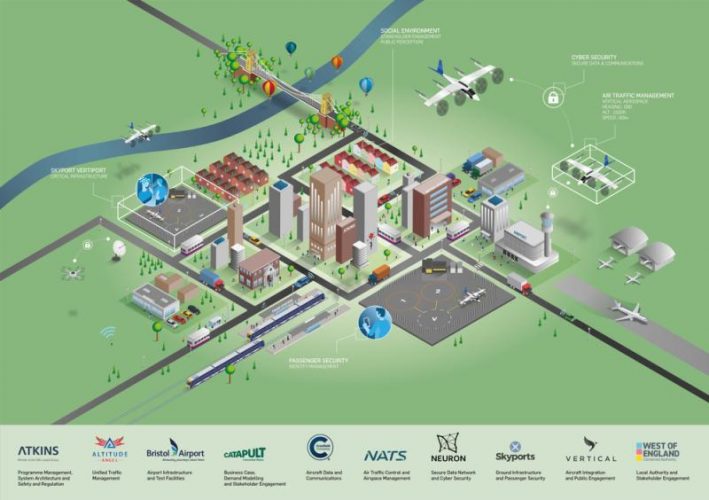An industry consortium plans a study followed by a demonstration in a live environment to look at the feasibility of an air taxi service in the South West region of England in response to the UK government’s Future of Flight Challenge. The Atkins-led consortium, which includes Vertical Aerospace and the West of England Combined Authority, was created to find innovative methods of achieving greener flight, finding new ways to travel, increasing mobility, improving connectivity and reducing congestion. The UK government is providing GBP2.5 million.
According to the Atkins press release, the project is expected to take 18 months, and will comprise an assessment of the demand for air taxi services in the South West; development of use cases for the technology; and an evaluation of the integration and impact on the wider transportation network, including the region’s airports, as well as the benefits to cities and residents. It will establish viable markets and businesses cases for these services and seek to understand public perceptions and attitudes towards eVTOL (electric vertical take-off and landing) aircraft. These activities aim to culminate in a series of full-system demonstrations in live airspace across the region.
Atkins, in addition to managing the project, will provide whole-system enterprise architecture, develop safety cases and create processes for secure passenger identification management.
Vertical Aerospace, a Bristol-based electric aircraft manufacturer will explore vehicle integration, using their eVTOL air taxi. Skyports, an infrastructure provider for the emerging Advanced Air Mobility (AAM) industry, will be responsible for design, development, operation and airport integration of the physical infrastructure to enable safe and efficient air taxi services.
Other consortium members include Altitude Angel and NATS, who will be investigating unified traffic management solutions and the integration of conventional air traffic control. Cranfield University will lead on the communication systems required to enable flight, particularly within an urban environment. London-based IT company Neuron will focus on interconnectivity to enable safe and efficient passenger movement. One of the British Government’s innovation agencies, Connected Places Catapult, will lead the research into public perception of air taxis, the ways this method of travel would be used, and the expected demand on AAM as a service. The West of England Combined Authority (WECA), offers the backing of a regional authority and will help ensure plans align with the Joint Local Transport Plan, and foster cross-sector collaboration between the project and the likes of the Future Transport Zone and 5G developments.
In addition to the grant partners, international gateway Bristol Airport will be acting as the principal support airport. Subsequent input will be provided by other airports in the region to ensure the concept’s transferability across different infrastructure.
While the feasibility studies and subsequent trials will be based in the South West, the project will also consider scalability and application in other cities.
James Richmond, Advanced Air Mobility Lead at Atkins, said: “As we look to the future of travel, it’s now more important than ever that we begin exploring more sustainable methods of transport within our increasingly populated cities. Bringing together the experience and expertise from across the consortium, we’re excited to begin developing a fully integrated system concept, using the latest digital innovations. This an important and tangible step towards making Advanced Air Mobility a reality, and by demonstrating that we can provide a case for air taxis, we could begin trialling these services as early as 2023.”
For more information visit:




